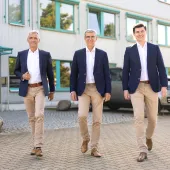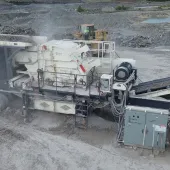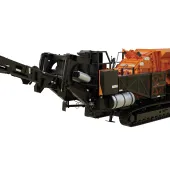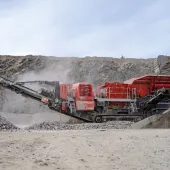Sandvik Mining and Construction supply equipment for Oman road project
Construction work has been undertaken for the last 12 months on a RO 19.5 million highway development in Salalah, which is aimed at significantly strengthening road communications in this part of the Oman, in the United Arab Emirates. Thirty-two kilometres in length, the Salalah bypass will span the entire length of Salalah City as it runs from Raysut in the east, towards Ayn Razat in the west.
The four-lane bypass, which has been built to international all-weather standards, possesses important benefits in ensuring the smooth flow of traffic through Salalah city onto the Salalah-Thamrait-Nizwa highway system. Foremost amongst these benefits will be its role in allowing heavy goods vehicles better road facilities that are more suitable for their requirements. This is needed as large volumes of freight traffic are expected to be generated as new investment in the port, free-trade zone and industrial estate generate greater industrial capacity in the coming years. Thus, when fully operational in 2011, the bypass will be capable of handling all heavy freight in and out of the port together with the industrial zone at Raysut, thereby easing traffic along the existing Raysut-Salalah road.
Due to the vital importance of the development the construction of the Salalah bypass was placed on a fast-track footing by the Supreme Committee for Town Planning - an organ of Oman’s Ministry of National Economy. The contract for the RO 19.5 million project was recently awarded to Oman Building and Contracting Company with National Engineering Office (NEO) being the design consultants for the project.
As a company Oman Building and Contracting Company LLC has placed a great deal of emphasis on ‘excellence’ in its operations. To this end, a key feature of the success of the Salalah bypass has been the processing of materials during the construction of the highway with Sandvik mobile screening and crushing equipment. The Sandvik fleet was supplied through local dealers, Al Fairuz Trading & Contracting Co.
A principal reason for the acquisition of the Sandvik machinery was due to the fact that at various locations in the project crushers and screening systems were needed to be used in conjunction in order to produce a range of base materials and aggregate for asphalt and civil engineering works from the indigenous materials. The Al Fairuz-supplied machinery has provided flexibility, mobility and reduction rates, thereby making a tremendous contribution to cost reduction through facilitating the processing of any suitable indigenous materials to be found in the vicinity of various road construction segments.
All the Sandvik impact and jaw crushers, together with assorted screens used on the project, are track mounted, self propelled and diesel hydraulically powered, allowing them to go to the source of any material as quickly as an excavator in order to commence processing immediately. The screens and crushers may be used either individually or in groups, and can be relocated within hours to a new segment of the project thereby combining productivity and flexibility.
One of the impact crushers used is the QI430, which is powered by a fuel-efficient 330kW C-13 Tier 3 compliant diesel engine, and features a manoeuverable tracked undercarriage and a Sandvik CI322 impactor with a fluid clutch drive. Fed via a two-deck pre-screen, the crusher is a four-hammer open-style rotor with a diameter of 1,150mm and a width of 1,330mm that discharges onto a secondary pan feeder. The plant is also equipped with a primary feeder and a separate two-deck pre-screen.
The screen used on the project was the QA450, which features a triple-deck screen box with an extra side conveyor, allowing it to produce up to a total of four product materials plus one oversize from the tipping grid. Designed for maximum productivity combined with accurate product sizing, the QA450 incorporates a large feed hopper, a pair of large screen boxes and extended conveyors that afford massive stockpiling capabilities. The screen box in the QA450 makes use of the tried and tested Doublescreen design, but now with a triple-deck design.
The material being processed is known as ‘wadi-gravel’, which consists of a mixture of limestone and basalt. The material possesses a feed size of 0-500mm, with the QI430 and the QA450 being used as a crushing and screening train to produce: 0-5mm, 5-12mm, and 12-22mm gradings. These two highly productive pieces of equipment are currently working two 10h shifts each day, averaging an impressive production of 250 tonnes/h over the last 12 months.
In order to enhance the flexibility of the screening and crushing operation a third machine is used to produce a 0-50mm grading - the Sandvik QI340 with product recirculation system.
To date the Sandvik machinery has proved equal to the task in processing the material, working 20h days. The combination of state-of-the-art Sandvik manufacturing, together with high levels of aftermarket support from Al Fairuz, will ensure that the Salalah bypass is completed on time, and with materials of the highest quality.









